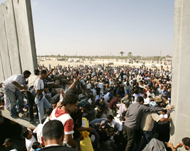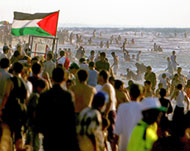Gaza-Egypt border fails to close
Scores of Palestinians have continued to cross from the Gaza Strip into Egypt, despite the passing of a Palestinian-set deadline aimed at closing the border to prevent further entries.

Groups of people on Wednesday continued to scale a high wall separating Egypt from Gaza and taxi-loads of Palestinians continued heading towards the Egyptian coastal town of el-Arish, about 40km to the west.
The crossings went on despite the passing of a Wednesday 6pm (1300 GMT) deadline to shut down the border.
Earlier on Wednesday, the Hamas resistance group blew a gaping hole in a concrete barrier on the Gaza Strip’s southern border, enabling Palestinians to surge into Egypt despite pledges to restore order.
Hamas detonated landmines next to the concrete slabs separating Palestinian Rafah from Egypt, blowing a hole which people could clamber through with ease.
Palestinians pushed their way inside Egypt, defying a small group of Egyptian soldiers.
A senior Egyptian border official told Aljazeera.net that the enthusiastic crowds were allowed to cross over for the first couple of days for “humanitarian reasons” and “to celebrate”, but that the newly deployed Egyptian troops would be manning the border more strictly starting from 6pm on Wednesday.
Hamas warning
 |
|
Palestinians pour into Egypt |
A local Hamas military commander warned the security forces not to try and seal off the border.
“If you close this hole, we will open 10 others,” Abu Attiyah shouted at onlooking Palestinian security officers.
Under pressure from Israel, Egyptian authorities set a new deadline for all Palestinians to return to the Gaza side while revealing that they had uncovered a weapons-filled tunnel on the border.
New deadline
A security source in Cairo said that Palestinians who had crossed into Egypt had until 1500 GMT on Wednesday to leave.
Police were touring the Egyptian side of Rafah with loud-hailers and urging Palestinians to return home voluntarily or face arrest and deportation, he added.
An Egyptian security official said that guards discovered a tunnel filled with weapons on the Gaza border.
“Three rocket-propelled grenade (RPG) launchers, 38 machine guns and 2,800 RPGs were found Tuesday in a tunnel four kilometres south of the Rafah crossing terminal,” the official told AFP on condition of anonymity.
It was not immediately possible to establish when the weapons were smuggled across, the source added.
Israeli concerns
Israel has repeatedly urged Egypt to restore order, as one official said smugglers were slipping weapons and ammunition into Gaza.
|
“Law and order will be maintained. Only you can go from one country to another through the appropriate regulations” Mohammed Asim Ibrahim, Egypt’s ambassador to Israel |
“Egypt is a big country which claims to respect our agreements but even without this agreement, it is inconceivable that Egypt as a sovereign country does not control its border,” said senior Defence Ministry official Amos Gilad.
“Some people are taking advantage of what’s going on at the border to smuggle weapons and munitions to the Gaza Strip which will be used for carrying out attacks but also to challenge the Palestinian Authority,” he warned.
Egypt’s ambassador to Israel vowed that law and order would be maintained on the border.
“Law and order will be maintained. Only you can go from one country to another through the appropriate regulations,” Mohammed Asim Ibrahim told public radio, speaking in English.
A series of giant concrete blocks were placed on the Rafah crossing overnight in an attempt to put a lid on chaos in which thousands of Gaza residents have crossed the border since Israel left the territory on Monday.
Denial
The Palestinian security commander for southern Gaza, Colonel Jamal Kayed, had announced that his men would seal the Rafah border with Egypt from midnight (2100 GMT).
But some of his officers on Wednesday denied that they had been given any such orders.
“It’s not our responsibility, it’s the government’s. There are no orders,” said one national security officer who declined to give his full name.
The troubled town was divided into two parts by a fence – and later an iron wall – under the 1982 peace treaty between and Egypt and Israel, which returned the occupied Sinai Peninsula to Egypt.
Thousands of Palestinian families were separated as a result.
First glimpse
 |
|
Beaches in the Gaza Strip are |
The Israeli withdrawal has given them the brief opportunity to reunite, many for the first time in 23 years, as they clambered over and through the barriers.
Many curious Egyptians living on the Egyptian side of Rafah also crossed over to get their first glimpses of the Gaza Strip.
For most of the past five years, Palestinians between the ages of 16 and 35 were not allowed out of the Gaza Strip by Israeli forces.
The Rafah crossing, which Israeli forces vacated last week but still control, was shut down last week, leaving 1.5 million Palestinians in Gaza stranded.
Located in the southern part of the Gaza Strip on the border with Egypt, Rafah has been one of the hardest hit areas in Gaza recent years.
Israeli forces pounded the impoverished refugee camp in two major security operations, leaving dozens of Palestinians dead and more than 16,000 homeless.
Aljazeera.net’s Laila El-Haddad in Gaza contributed to this report